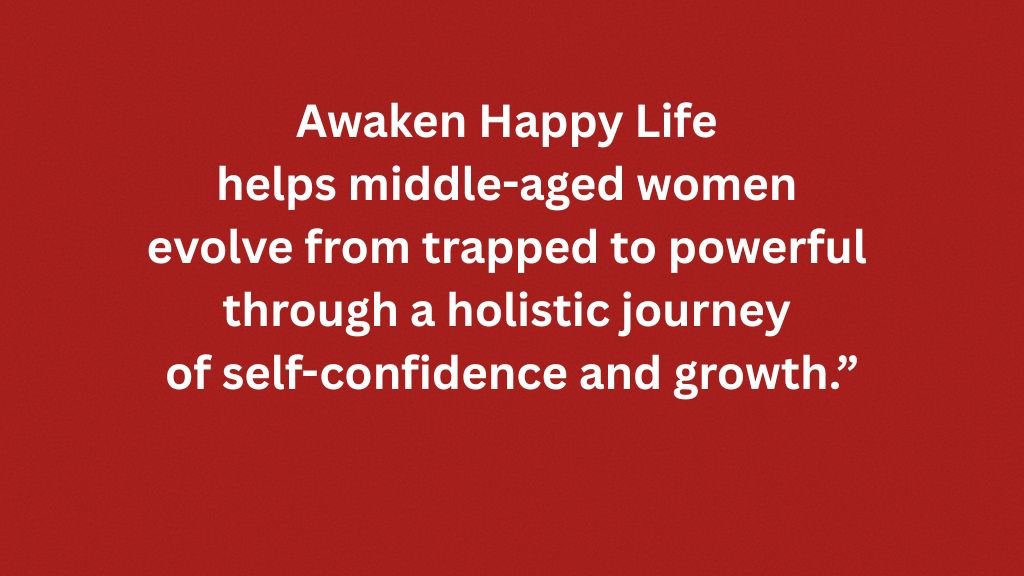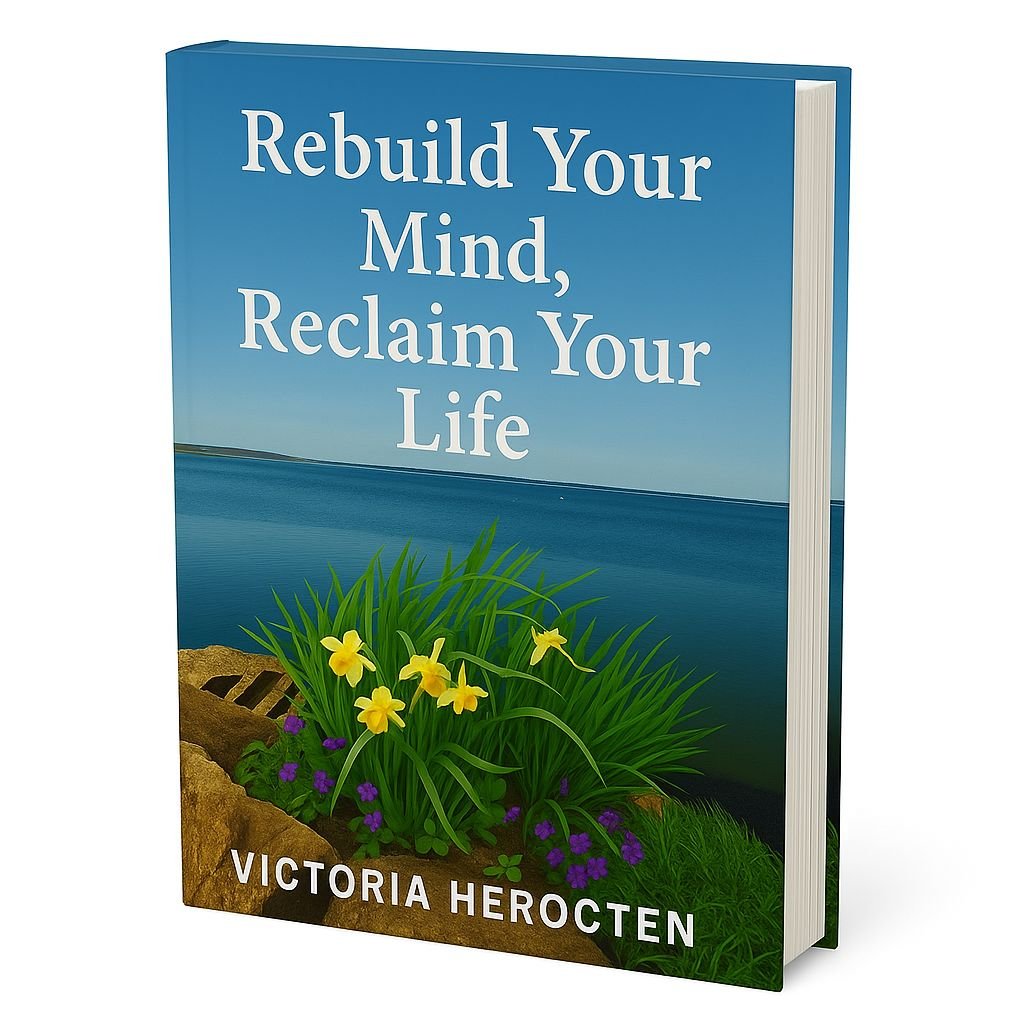Toxic beliefs are powerful — often more so than the toxic people who helped plant them. For middle-aged women living in dysfunctional family systems, these beliefs can act as invisible chains, keeping them stuck in cycles of guilt, obligation, and self-neglect.

In this post, we’ll explore three of the most damaging ones. I will show how toxic beliefs play out in daily life. You will learn how and examine the long-term consequences if they remain unchallenged.
“At Awaken Happy Life, we guide middle-aged women on a holistic journey to break free from limitations and grow into powerful, confident selves.”
Toxic Belief #1:
“Taking care of my old parents is necessary because they did it for me in my childhood.”
On the surface, the worst of toxic beliefs sounds noble, rooted in gratitude and a sense of moral duty. It reflects a standard cultural narrative: parents cared for us when we were young. Therefore, we must return the favour when they grow old. While appreciation for genuine care is healthy, this belief can turn into a powerful chain. It happens when the parents in question are toxic, manipulative, or emotionally abusive.
When you hold this beleif without nuance, it can trap you in a cycle of guilt and obligation. These disempowering mental patterns override your own well-being. It can cause you to ignore your boundaries, sacrifice your emotional health, and tolerate behaviour that continues to harm you. It is simply because “it’s the right thing to do.” For some, this sense of duty is reinforced by other family members or societal expectations. These people make it even harder to question.
Genuine gratitude doesn’t require self-sacrifice to the point of emotional servitude. A healthy relationship between adult children and ageing parents is built on mutual respect, not coercion or unending repayment. Caring for your parents can be an act of love. Still, when toxic beliefs cost you mental health, safety, or autonomy, it’s worth asking whether the obligation is genuine. You can also question if it’s the residue of a belief planted in childhood and never examined.
This is not about abandoning responsibilities but about recognising the difference between freely chosen care and coerced compliance. Without that awareness, this belief can quietly strip away your freedom and keep you emotionally tied to patterns you should have left behind long ago.
Scenario
Anna, 52, works full-time but spends every evening and weekend at her parents’ house, cooking, cleaning, and running errands. Her hobbies, friendships, and dating life have vanished. When she hints at needing time for herself, her parents remind her of the sacrifices they made when she was young.
Impact
Anna feels a deep, almost physical pang of guilt whenever she dares to put herself first. Even the simplest acts of self-care—meeting a friend for coffee, buying herself something nice, or taking a weekend to rest—set off a wave of anxiety and shame. She can’t enjoy the moment because a voice in her head insists she’s being selfish or neglectful.
In her mind, her parents’ needs must always come before her own, no matter how exhausted, financially strained, or emotionally depleted she feels. Over time, this relentless self-denial has made her resentful. However, she feels trapped by the belief that “good daughters” sacrifice endlessly. The more she gives, the more is expected, and the harder it becomes to imagine a life where her needs are just as valid as anyone else’s.

Long-Term Consequences:
If Anna continues to live by this belief, she’s heading toward complete emotional and physical burnout. The constant stress of prioritising others while ignoring her own needs will take a toll on her health, manifesting as chronic fatigue, anxiety, depression, or stress-related illnesses. Her social world will shrink as she repeatedly turns down invitations, and her friendships may fade, leaving her isolated.
Over the years, her identity will become so entwined with caregiving. She won’t know who she is outside of it. When Anna reaches her later years, she feels regret—realising she spent decades living for others. Anna never allowed herself the chance to live her own life fully. By then, much of that time will be gone, along with the opportunities she might have embraced had she believed her well-being was just as important as anyone else’s.
“Gratitude does not mean sacrificing your own life; it means living fully and honouring those who gave you the chance to do so.” — Unknown
January Sale!
Start 2026 with a new, healed self, able to build happy relationships. Now at a much lower price.

Toxic Belief #2:
“My worth depends on how much I do for my family.”
The second of toxic beliefs can feel like love and loyalty, but in reality, it turns your identity into a full-time service role. You measure your value not by who you are, but by what you can provide—whether it’s time, energy, money, or emotional labour.
For middle-aged women in toxic families, this often becomes a trap where no amount of giving is ever “enough.” The more you do, the more others expect from you, but this causes you to feel drained and invisible. Over time, you forget what you want or need because other people’s approval defines your self-worth entirely
Short Story
Maria, 48, has built her life around accommodating her siblings and extended family, often at significant personal cost. When her brother needs help moving, she doesn’t just lend a hand—she cancels a long-awaited weekend trip she’s been looking forward to for months, losing money on the booking without a second thought. When her cousin calls in the middle of the night in crisis,
Maria answers immediately, sitting on the phone for hours, even if she has an important meeting the next morning. It doesn’t matter if she’s ill, busy, or desperately in need of rest—she drops everything to be available. Her plans, hobbies, and personal goals are constantly pushed aside to fit the needs of others. Friends have stopped inviting her to events because she so often cancels. Over time, she has begun to feel as though her life is not her own, but an open resource for anyone in the family who demands it.
Impact
Maria, 48, has built her life around accommodating her siblings and extended family, often at significant personal cost. When her brother needs help moving, she cancels a long-awaited weekend trip, forfeiting money she can’t get back. When her cousin calls in the middle of the night in crisis, Maria answers immediately, listening for hours, even if it means stumbling through work the next day.
It doesn’t matter if she’s exhausted, sick, or in the middle of something important—she drops everything to be available. Over time, Maria pushed aside her plans, hobbies, and personal goals. Friends invite her out less because she so often cancels. She’s begun to feel invisible in her own life, defined only by what she can do for others.
Long-term Consequences
If Maria continues to equate her worth with how much she does for her family, she risks long-term burnout and profound emotional depletion. Constantly putting her needs last will erode her physical health, sap her energy, and keep her from developing her dreams.
Without space for personal growth, she may reach her later years with the painful realisation that she spent her life serving others while neglecting herself. This could leave her not only resentful but also dependent—financially and emotionally—on the very people she sacrificed for, reinforcing the cycle of obligation and self-abandonment.
“Putting yourself first at times isn’t selfish — it’s how you sustain the ability to care for others.” — Eleanor Brown
Toxic Belief #3:
“Keeping the peace is more important than speaking my truth.”
Scenario
Laura, 50, has spent decades deferring to her father’s opinions on everything from her career to her relationships. When she bought a new car that he disapproved of, she felt anxious for weeks. Her father uses phrases like ‘I’ve lived longer, so I know better’ to silence her.
Impact
Laura, 50, following toxic beliefs, has learned to measure her decisions against her father’s approval before making them. For years, she’s allowed his opinions to override her own instincts, whether about work opportunities, friendships, or major purchases.
When she recently bought a car he didn’t like, she couldn’t enjoy it. Laura spent weeks worrying she’d made the wrong choice. His constant reminders, such as “I’ve lived longer, so I know better,” make her doubt her judgment. To avoid his criticism, she often adjusts her plans or stays quiet altogether, slowly losing confidence in her ability to make choices for herself.
Long-term Consequences
If Laura continues to prioritise peace over honesty, she will lose even more of her identity. This silence leaves her vulnerable to control and erodes her confidence. This may lead to a lifetime of regret for never letting her voice be heard.
Check all articles about toxic beliefs:
Ready to break free from toxic beliefs for good? Download my free e-book “Heal The Beliefs That Hurt You” and start building a life that feels truly yours.
Closing Thoughts
Toxic beliefs don’t dissolve on their own — they require conscious examination and, often, professional support to dismantle. Recognising them is the first step toward reclaiming your independence and rewriting the narrative of your life.
In the following posts in this series, we’ll cover more of these hidden traps and share practical steps for breaking free from each one.
Victoria Herocten


